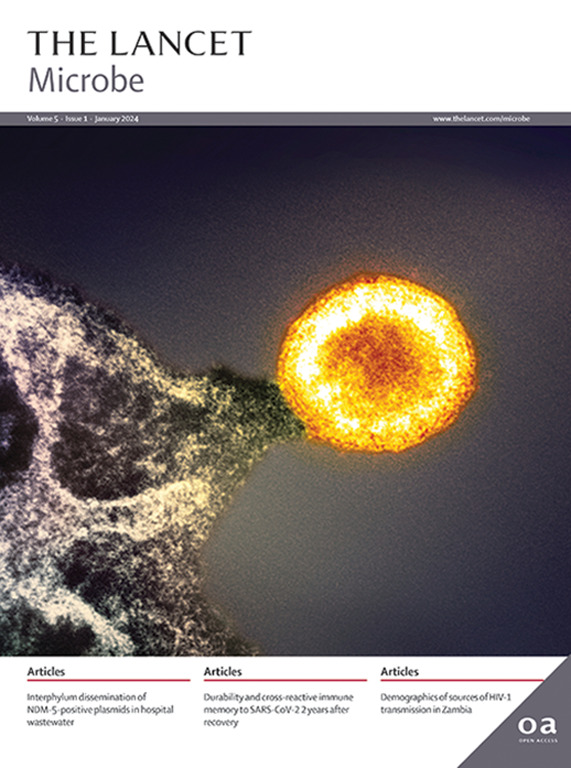2021 年坦桑尼亚 13 个地区青蒿素部分抗药性和磺胺乙胺嘧啶抗药性相关突变的流行情况:横断面调查。
IF 20.9
1区 生物学
Q1 INFECTIOUS DISEASES
引用次数: 0
摘要
背景:卢旺达出现的恶性疟原虫凯尔奇 13 基因(k13)中的青蒿素部分耐药性(ART-R)突变 Arg561His 以及影响磺胺多辛-乙胺嘧啶的区域性多态性引起了邻国坦桑尼亚的关注。这项研究的目的是评估坦桑尼亚的抗疟药物耐药性状况,重点是与卢旺达接壤的边境地区,以了解 Arg561His 突变的分布、伙伴耐药性和对化学预防药物的耐药性:在这项横断面调查中,我们于 2021 年 1 月 31 日至 6 月 26 日在坦桑尼亚大陆的 13 个地区采集了社区疟疾阳性无症状者和医疗机构中 6 个月及以上有症状者的毛细管干血斑。排除标准包括居住在目标地点以外的地区、因疟疾以外的疾病到医疗机构接受护理和治疗以及未提供知情同意书。使用针对恶性疟原虫的分子反转探针和短读全基因组测序对样本进行抗疟多态性和遗传相关性评估。主要结果是抗疟分子标记在卡盖拉地区(该国西北部与卢旺达交界的一个地区)的地区级和县级的流行率:在采集的 7782 份毛细管干血斑样本中,有 6855 份(88-1%)成功进行了基因分型。k13 Arg561His在卡盖拉的总流行率为7-7%(90% CI 6-0-9-4;649份样本中的50份),在靠近卢旺达边境的地区流行率最高(Karagwe为22-8%[136份样本中的31份],Kyerwa为14-4%[118份样本中的17份],Ngara为1-4%[144份样本中的2份]),k13 Arg561His在其他地区并不常见。单倍型分析表明,其中一些寄生虫与2015年在卢旺达收集到的分离株有关,支持Arg561His的区域传播。不过,也观察到了一种新的 k13 Arg561His 单倍型,可能表明该地区存在第二个来源。此外还发现了其他经过验证的 k13 抗性多态性(一个 Arg622Ile 和两个 Ala675Val 分离物)。在卡盖拉(15-2% [12-6-17-8%];526 例中有 80 例)还发现了与磺胺多辛-乙胺嘧啶抗药性相关的二氢叶酸还原酶 Ile164Leu 突变区域。与氯喹和阿莫地喹抗药性有关的突变体crt Lys76Thr并不常见,在2861个基因分型的分离物中仅有75个出现,而与对鲁米抗原敏感性降低有关的野生型mdr1 Asn86Tyr等位基因则在全国99-7%的样本中发现(3830个样本中有3819个):这些研究结果表明,k13 Arg561His 突变在坦桑尼亚西北部地区很常见,并且出现了与东南亚地区类似的 ART-R 多发现象。与高水平的磺胺多辛-乙胺嘧啶耐药性相关的突变也很常见。这些结果令人担忧青蒿素和化学预防抗疟药在该地区的长期疗效。了解多种抗药性的出现如何与区域传播的驱动因素相互作用,对于在非洲抗击抗逆转录病毒疗法至关重要:本研究由比尔及梅林达-盖茨基金会和美国国立卫生研究院资助。本文章由计算机程序翻译,如有差异,请以英文原文为准。
Prevalence of mutations associated with artemisinin partial resistance and sulfadoxine–pyrimethamine resistance in 13 regions in Tanzania in 2021: a cross-sectional survey
Background
The emergence of the artemisinin partial resistance (ART-R) mutation in the Plasmodium falciparum kelch13 gene (k13), Arg561His, in Rwanda and the regional presence of polymorphisms affecting sulfadoxine–pyrimethamine have raised concern in neighbouring Tanzania. The goal of this study was to assess the status of antimalarial resistance in Tanzania, with a focus on the border with Rwanda, to understand the distribution of the Arg561His mutation, partner drug resistance, and resistance to chemoprevention drugs.
Methods
In this cross-sectional survey, capillary dried blood spots were collected from malaria positive asymptomatic individuals in the community and symptomatic individuals in health facilities aged 6 months and older, in 13 regions of mainland Tanzania from Jan 31 to June 26, 2021. Exclusion criteria included residence of the areas other than the target sites, presenting to the health facility for care and treatment of conditions other than malaria, and not providing informed consent. Samples were assessed for antimalarial resistance polymorphisms and genetic relatedness using molecular inversion probes targeting P falciparum and short-read whole-genome sequencing. The primary outcome was the prevalence of molecular markers of antimalarial resistance at the region level, as well as at the district level in Kagera, a region in the northwest of the country at the border with Rwanda.
Findings
6855 (88·1%) of 7782 capillary dried blood spot samples collected were successfully genotyped. The overall prevalence of k13 Arg561His in Kagera was 7·7% (90% CI 6·0–9·4; 50 of 649), with the highest prevalence in the districts near the Rwandan border (22·8% [31 of 136] in Karagwe, 14·4% [17 of 118]) in Kyerwa, and 1·4% [two of 144] in Ngara). k13 Arg561His was uncommon in the other regions. Haplotype analysis suggested that some of these parasites are related to isolates collected in Rwanda in 2015, supporting regional spread of Arg561His. However, a novel k13 Arg561His haplotype was observed, potentially indicating a second origin in the region. Other validated k13 resistance polymorphisms (one Arg622Ile and two Ala675Val isolates) were also identified. A region of prevalent dihydrofolate reductase Ile164Leu mutation, associated with sulfadoxine–pyrimethamine resistance, was also identified in Kagera (15·2% [12·6–17·8%]; 80 of 526). The mutant crt Lys76Thr mutation, associated with chloroquine and amodiaquine resistance, was uncommon, occurring only in 75 of 2861 genotyped isolates, whereases the wild-type mdr1 Asn86Tyr allele, associated with reduced sensitivity to lumefantrine, was found in 99·7% (3819 of 3830) of samples countrywide.
Interpretation
These findings show that the k13 Arg561His mutation is common in northwest Tanzania and that multiple emergences of ART-R, similar as to what was seen in southeast Asia, have occurred. Mutations associated with high levels of sulfadoxine–pyrimethamine resistance are common. These results raise concerns about the long-term efficacy of artemisinin and chemoprevention antimalarials in the region. Understanding how multiple emergences interact with drivers of regional spread is essential for combating ART-R in Africa.
Funding
This study was funded by the Bill & Melinda Gates Foundation and the National Institutes of Health.
求助全文
通过发布文献求助,成功后即可免费获取论文全文。
去求助
来源期刊

Lancet Microbe
Multiple-
CiteScore
27.20
自引率
0.80%
发文量
278
审稿时长
6 weeks
期刊介绍:
The Lancet Microbe is a gold open access journal committed to publishing content relevant to clinical microbiologists worldwide, with a focus on studies that advance clinical understanding, challenge the status quo, and advocate change in health policy.
 求助内容:
求助内容: 应助结果提醒方式:
应助结果提醒方式:


